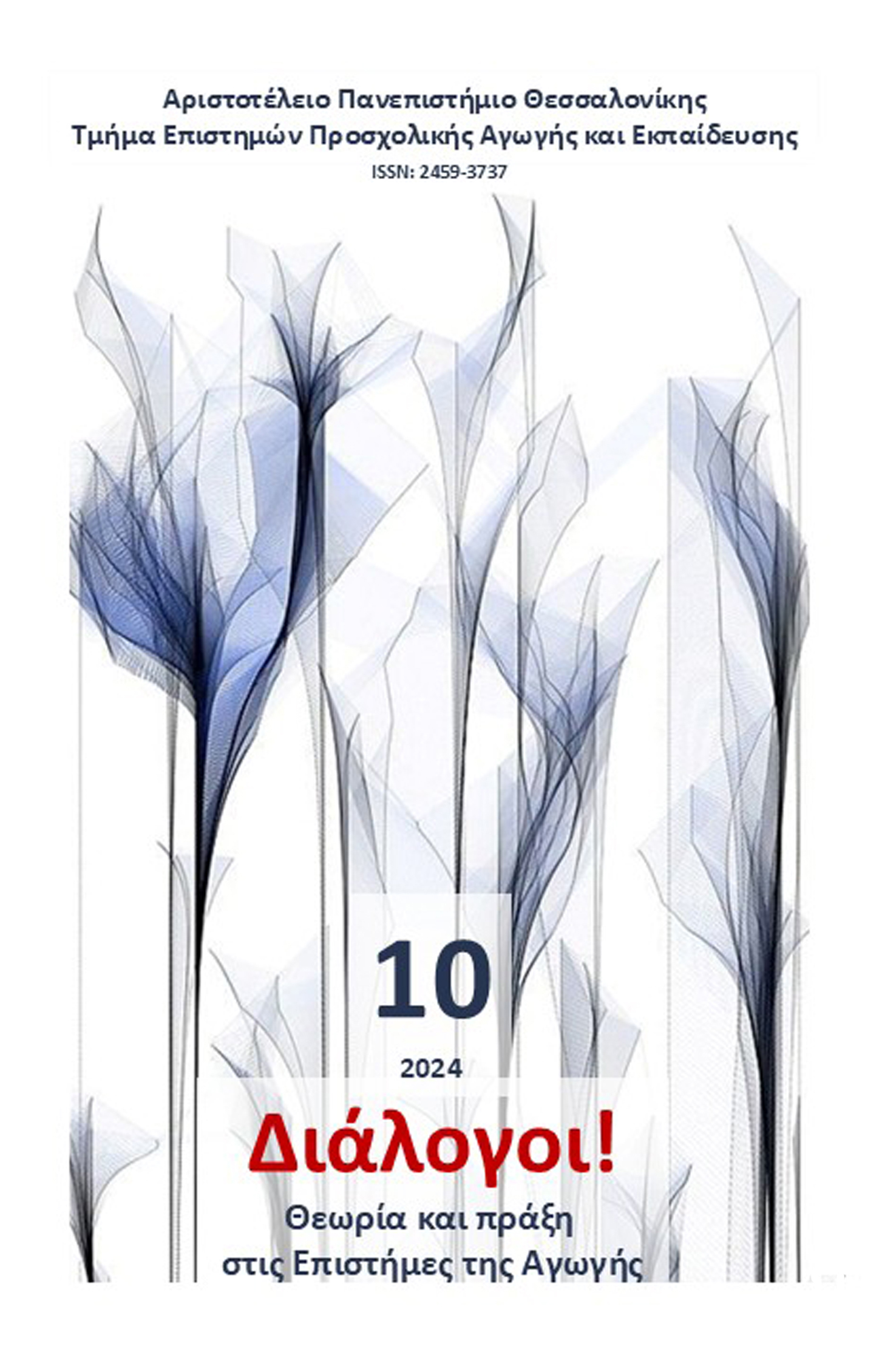H εφαρμογή και o έλεγχος της κοινωνικής εγκυρότητας ενός προγράμματος στην τέχνη για τη βελτίωση της συναισθηματικής ρύθμισης των εκπαιδευτικών

Περίληψη
Τα συναισθήματα των εκπαιδευτικών σχετίζονται με μια ποικιλία σημαντικών διδασκαλικών αποτελεσμάτων. Οι καλλιτεχνικές δημιουργικές δραστηριότητες προσφέρουν μια δυναμική που ωθεί τους συμμετέχοντες να εργαστούν ολιστικά αφυπνίζοντας το σώμα, τις αισθήσεις, το συναίσθημα και το νου, προκειμένου να κατανοήσουν τα συναισθήματά τους και τη διαχείρισή τους. Σκοπός της παρούσας έρευνας ήταν η ποιοτική αξιολόγηση ενός προγράμματος εκπαίδευσης σε διάφορες μορφές Τέχνης, το οποίο σχεδιάστηκε και εφαρμόστηκε προκειμένου να ενισχύσει την ικανότητα συναισθηματικής ρύθμισης των εκπαιδευτικών. Στην έρευνα πήραν μέρος 11 εκπαιδευτικοί πρωτοβάθμιας εκπαίδευσης. Η ποιοτική αξιολόγηση του εκπαιδευτικού προγράμματος στην Τέχνη από τους συμμετέχοντες έγινε στο τέλος της εφαρμογής του και είχε ως στόχο τον έλεγχο της κοινωνικής εγκυρότητας του προγράμματος. Το ερευνητικό εργαλείο που χρησιμοποιήθηκε ήταν ένα Αυτοσχέδιο Ερωτηματολόγιο Ικανοποίησης από το Πρόγραμμα. Τα αποτελέσματα έδειξαν ότι οι στόχοι και η διαδικασία του προγράμματος έλαβαν υψηλή κοινωνική αποδοχή από τους συμμετέχοντες, ενώ ελάχιστα χαμηλότερη ήταν αυτή της σημαντικότητας των αποτελεσμάτων.
Λεπτομέρειες άρθρου
- Πώς να δημιουργήσετε Αναφορές
-
Ιωάννογλου Κ. (2024). H εφαρμογή και o έλεγχος της κοινωνικής εγκυρότητας ενός προγράμματος στην τέχνη για τη βελτίωση της συναισθηματικής ρύθμισης των εκπαιδευτικών. Διάλογοι! Θεωρία και πράξη στις επιστήμες αγωγής και εκπαίδευσης, 10, 238–261. https://doi.org/10.12681/dial.36790
- Τεύχος
- Τόμ. 10 (2024)
- Ενότητα
- Παρουσιάσεις καινοτόμων προγραμμάτων

Αυτή η εργασία είναι αδειοδοτημένη υπό το CC Αναφορά Δημιουργού – Μη Εμπορική Χρήση – Παρόμοια Διανομή 4.0.
Οι συγγραφείς των άρθρων που δημοσιεύονται στο Διάλογοι! Θεωρία και Πράξη στις Επιστήμες Αγωγής και Εκπαίδευσης διατηρούν τα δικαιώματα πνευματικής ιδιοκτησίας επί των άρθρων τους, δίνοντας στο περιοδικό το δικαίωμα της πρώτης δημοσίευσης. Άρθρα που δημοσιεύονται στο Διάλογοι! Θεωρία και Πράξη στις Επιστήμες της Αγωγής και Εκπαίδευσης διατίθενται με άδεια Creative Commons 4.0 και σύμφωνα με την άδεια μπορούν να χρησιμοποιούνται ελεύθερα, με αναφορά στον/στη συγγραφέα και στην πρώτη δημοσίευση για μη κερδοσκοπικούς σκοπούς και με δικαίωμα τροποποίησης μόνον με παρόμοια διανομή (αν αναμείξετε, τροποποιήσετε, ή δημιουργήσετε πάνω στο υλικό, πρέπει να διανείμετε τις δικές σας συνεισφορές υπό την ίδια άδεια όπως και το πρωτότυπο).
To Τμήμα Επιστημών Προσχολικής Αγωγής και Εκπαίδευσης του Αριστοτέλειου Πανεπιστημίου Θεσσαλονίκης και το Εθνικό Κέντρο Τεκμηρίωσης διατηρούν το δικαίωμα να δημοσιεύουν, να αναπαραγάγουν, να παρουσιάζουν στο κοινό, να διανέμουν και να χρησιμοποιούν άρθρα που δημοσιεύονται στο Διάλογοι! Θεωρία και Πράξη στις Επιστήμες Αγωγής και Εκπαίδευσης σε οποιοδήποτε μέσο και μορφή είτε μεμονωμένα είτε ως μέρη συλλογικών έργων, για όλο το χρόνο διάρκειας προστασίας της πνευματικής ιδιοκτησίας και για όλες τις χώρες του κόσμου.
Αυτό περιλαμβάνει ενδεικτικά, και όχι αποκλειστικά, το δικαίωμα δημοσίευσης των άρθρων σε τεύχη του περιοδικού Διάλογοι! Θεωρία και Πράξη στις Επιστήμες Αγωγής και Εκπαίδευσης, αναπαραγωγής και διανομής μεμονωμένων αντιγράφων των άρθρων, αναπαραγωγής ολόκληρων των άρθρων σε άλλη έκδοση του Τμήματος Επιστημών Προσχολικής Αγωγής και Εκπαίδευσης του Αριστοτέλειου Πανεπιστημίου Θεσσαλονίκης και του Εθνικού Κέντρου Τεκμηρίωσης και αναπαραγωγής και διανομής των άρθρων ή περίληψης αυτών με χρήση πληροφορικού συστήματος αποθετηρίου.


